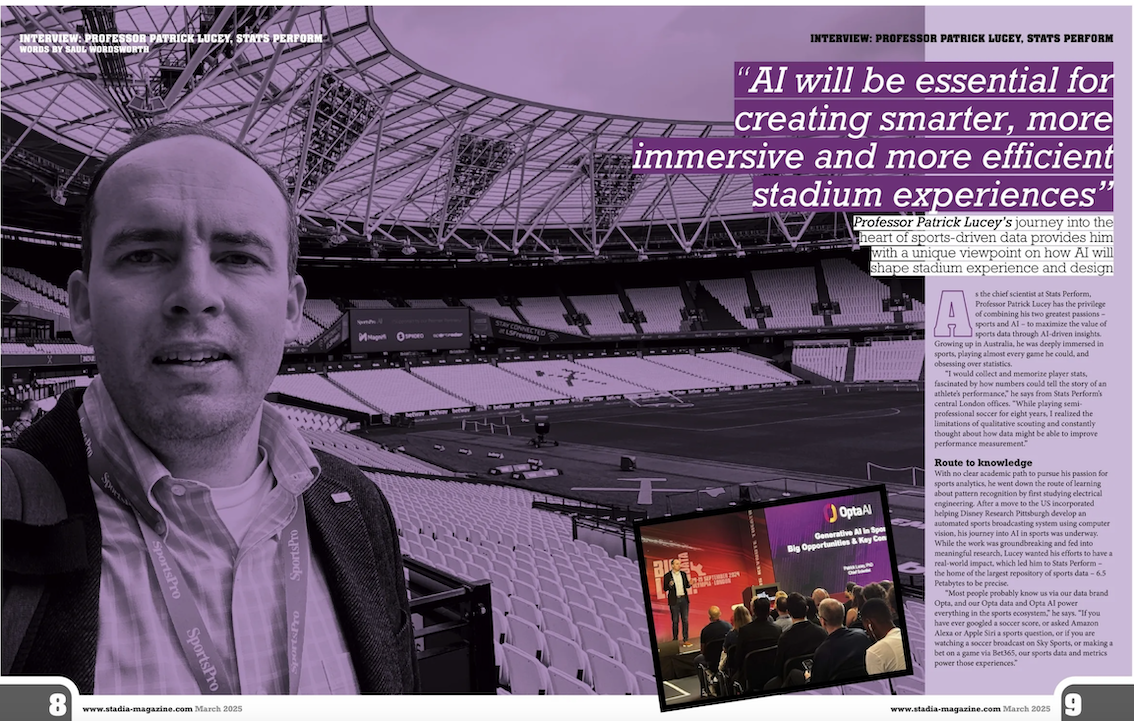“AI will be essential for creating smarter, more immersive and more
efficient stadium experiences”
Professor Patrick Lucey’s journey into the heart of sports-driven data provides him with a unique viewpoint on how AI will shape stadium experience and design
***
As the chief scientist at Stats Perform, Professor Patrick Lucey has the privilege of combining his two greatest passions – sports and AI – to maximize the value of sports data through AI-driven insights. Growing up in Australia, he was deeply immersed in sports, playing almost every game he could, and obsessing over statistics.
“I would collect and memorize player stats, fascinated by how numbers could tell the story of an athlete’s performance,” he says from Stats Perform’s central London offices. “While playing semi-professional soccer for eight years, I realized the limitations of qualitative scouting and constantly thought about how data might be able to improve performance measurement.”
Route to knowledge
With no clear academic path to pursue his passion for sports analytics, he went down the route of learning about pattern recognition by first studying electrical engineering. After a move to the US incorporated helping Disney Research Pittsburgh develop an automated sports broadcasting system using computer vision, his journey into AI in sports was underway. While the work was groundbreaking and fed into meaningful research, Lucey wanted his efforts to have a real-world impact, which led him to Stats Perform – the home of the largest repository of sports data – 6.5 Petabytes to be precise.
Read the interview in full in the digital edition of March’s Stadia Magazine
“Most people probably know us via our data brand Opta, and our Opta data and Opta AI power everything in the sports ecosystem,” he says. “If you have ever googled a soccer score, or asked Amazon Alexa or Apple Siri a sports question, or if you are watching a soccer broadcast on Sky Sports, or making a bet on a game via Bet365, our sports data and metrics power those experiences.”
Having joined an AI team of one, in his ten years with Stats Perform Lucey has grown it to over 50 scientists and engineers across the globe.
“We use AI to both collect data via humans and computer vision, but also consume it via AI technology.”
Shaping the stadium experience
AI in sports is not new; it has been in use for over 25 years. Ball tracking using computer vision (a subset of AI) started in the early 2000s, and Stats Perform pioneered player tracking in basketball and soccer in 2010 with its SportVU system. Other innovations followed, including leveraging AI to create win probabilities and automated insights.
“While many people may not realize it, they engage with AI-driven sports data every time they watch or discuss a game,” he says.
From a stadium perspective, AI is enabling sports teams to display and communicate more engaging content and real-time insights about teams and players on big screens across various sports. This is important because fans demand the same stats, facts and analysis when they are attending a game that they receive when watching at home.
“This information and content not only enhance the live-game experience but can also encourage fans to arrive earlier and enjoy premium lounge and box experiences. We do this with Bayern Munich for example, who use our AI-powered visual content creation engine, Opta Graphics, to automatically display informative, useful and relevant information about the game, the players and their performances across 1,500+ screen network at the Allianz Arena – but also in their hospitality suites.”
This has enhanced fan engagement as it quenches the thirst of fans’ increasing desire for statistics. For Lucey however, the most exciting development in fan engagement is the rise of Generative AI (GenAI); AI assistants powered by GenAI offering hyper-personalized content.
“This enables fans to interact with data, sport and its moments in unprecedented ways,” he says. “I believe the future of innovation in fan engagement will center around this technology.
In-venue insights
In today’s fragmented, asynchronous world, live sports stand out as a shared experience that brings fans together. Over the next five years, as people increasingly recognize the value of live events, Lucey expect the significance of in-person sports experiences to grow.
ChatGPT has demonstrated that AI is the ultimate engagement tool, allowing people to interact and converse with data in ways never before possible. However, one downside of modern technology is that it often reinforces echo chambers, with people consuming content that aligns with their own existing perspectives.
“The combination of live sports and GenAI flips this paradigm,” says Lucey. “The action on the field becomes the focal point, sparking shared conversations among fans. To fully realize this vision, we need not only live and deep data about the game but also historical data that allows fans to ask questions, analyze hypotheticals and explore any aspect of the sport. This is the future of fan engagement – where 50,000+ fans in a stadium can access AI-powered insights in real time, creating unique, in-venue experiences.”
Aiding stadium design
At a recent Sports Pro AI conference, Lucey was captivated by a presentation from a representative of stadium architect Populous.
“They showcased how they are using AI to design stadiums and optimize for various criteria such as revenue, but also engage with AI to aid with restroom placement and the overall layout for those with disabilities,” he says. “Previously you would have to use your gut instinct, but being able to simulate this out with AI across various scenarios is relatively cheap to do using software, instead of building a stadium and then making changes to adapt to various needs and criteria.”
The Prince Mohammed Bin Salman Stadium under construction for the FIFA World Cup in 2034 is a project Lucey cites; a marriage of sport, design and technology that can re-define what it means to attend an event inside a stadium, and what that fan experience consists of.
“Other AI examples include outdoor venues having accurate detailed weather forecasts by using Google DeepMind’s GenCast. This can help with surface preparation but also planning for optimal safety and comfort for fans as well as workers.”
The same type of predictive technology can help with logistics within the stadiums. Lucey notes that GenAI technology can be used to enable fans to ask questions about the various concessions or facilities in the stadium via an AI assistant, and provide possible incentives for fans to buy something based on what has just occurred, or when certain locations in the stadium may be overstocked on particular items.
There is obviously no replacement for being in the stadium, but you could even potentially share that experience with a loved one who cannot be due to distance or mobility issues, via virtual reality.
“I love watching sports with my father, but he lives in another country and has mobility issues, so being able to share some moments with him and my children could be priceless. AI can enhance those shared moments which is very exciting as well.”
Preparing for a new era
Lucey is very clear about what the future holds and therefore its requirements; that stadium executives need to educate themselves and their employees about AI.
“With the explosion of Generative AI, there’s a lot of hype, and it’s critical to separate what AI can do from what it can’t do,” he says. “Since every stadium has unique characteristics and use cases, executives must assess how AI can enhance their specific fan experience and operations.”
To fully leverage AI, stadiums must utilize their own data. From his work, Lucey fully understands that data is the fuel that powers AI, and he recognizes that the stadiums which actively collect, structure and analyze their own data will have a major advantage.
“Whether it’s improving fan engagement, optimizing stadium operations or enhancing security, AI will be an essential tool for creating smarter, more immersive and more efficient stadium experiences in the years to come.






